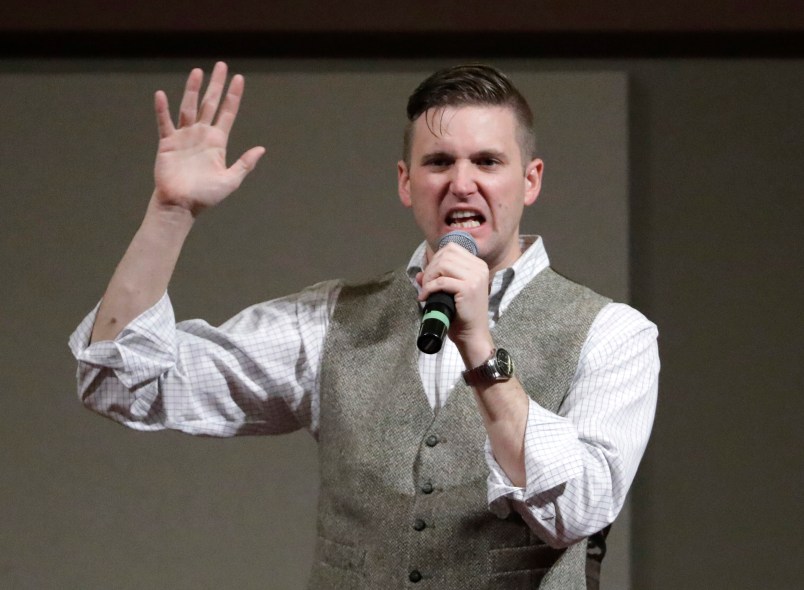CLEVELAND (AP) — The University of Cincinnati says it will allow white nationalist leader Richard Spencer to speak on campus, while Ohio State University says it can’t accommodate a rental request for a Nov. 15 speech but is considering alternatives.
UC president Neville Pinto said in an email that the university is finalizing details of Spencer’s visit and promises to make safety a priority. Pinto said in the university-wide email on Friday that Spencer’s “ideology of hate and exclusion is antithetical” to the university’s core values but that as a public institution it had to allow Spencer to speak because of his constitutional right to free speech.
“It is the power and promise of (our) diversity to change the world for the better that has the hate-filled so unsettled,” Pinto said. “We ask for your patience, support, and understanding as we prepare for a trying time for our community.”
The director of Ohio State’s legal office, Christopher Culley, said in a letter that it couldn’t accommodate a request for Spencer to speak on Nov. 15 “without substantial risk to public safety” but expects to decide if there are “viable” alternatives by the end of next week.
An attorney for Spencer’s associates, Kyle Bristow, said in a press release that he would hold off on suing the schools after earlier writing emails saying they had until Friday to agree to make campus space available for Spencer or face a lawsuit. Both universities were contacted last month about allowing Spencer to visit but had delayed making final decisions.
“I imagine similar reviews are not required of politically left-wing events on campus, and your ‘review’ is therefore unconstitutionally discriminatory in and of itself,” Bristow wrote to the universities at the time.
Bristow is the founder of a law firm dedicated to legal advocacy on behalf of a loose collection of white nationalists, white supremacists and anti-immigration populists called the alt-right.
The Ohio universities are the latest targeted for appearances by Spencer since he participated in an August white nationalist rally in Charlottesville, Virginia, that led to deadly violence.
The Charlottesville rally left universities across the U.S. bracing for more clashes between right-wing extremists and those who oppose them. It also left schools struggling to ensure campus safety in the face of recruiting efforts by white nationalist and neo-Nazi groups while balancing concerns over freedom of speech.
Spencer is scheduled to speak Oct. 19 at the University of Florida. That university’s president is urging students to stay away from Spencer’s appearance and to speak out against “hate and racism.”
UF says it expects to spend $500,000 on security for the event. It said as a public institution it is legally obligated to allow the expression of many viewpoints by external groups, such as Spencer’s National Policy Institute.







Hope these campuses and their local communities are aware of the flashmob tactic now employed by Spencer. Wouldn’t be surprised if a few of these spring up the night before or after one of these speeches.
Wish that some of these schools would send the security bill - for costs higher than what is par for the course for a generic speaker on campus - to the Spencer’s organization - as most of these are state institutions and the tax payers across the state shouldn’t have to subsidize the Spencer’s provocation tour.
There are 2 perfect options here, ignore or ridicule.
The best reaction to this is to ignore and turn your back on this Nazi. Silent protesting works best. Do not engage.
Well can I go and throw shit at him? That’s speech, too.
They can charge Spencer for security, but charging him more than others is iffy. Texas A&M actually solved this problem. Under their new policy, there is no public forum on their campus. Any speaker in any facility must be an invited guest of the University or of one of the recognised student organizations on campus. You can’t invite yourself, or demand use of a facility, or rent a facility.